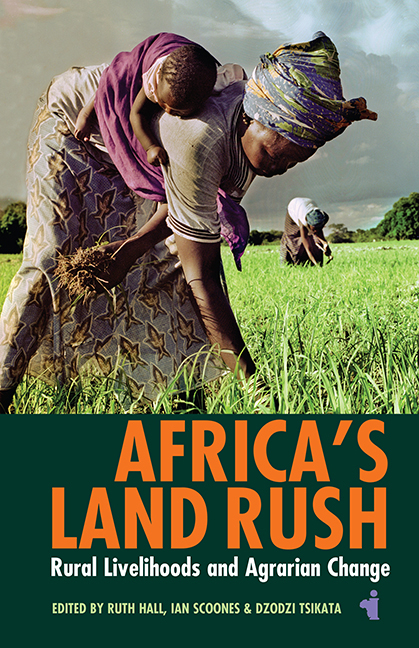Book contents
- Frontmatter
- Contents
- List of Maps, Tables & Figures
- Notes on Contributors
- Preface
- Acknowledgements
- List of Abbreviations
- 1 Introduction: The Contexts & Consequences of Africa’s Land Rush
- 2 State, Land & Agricultural Commercialisation in Kwara State, Nigeria
- 3 Recent Transnational Land Deals & the Local Agrarian Economy in Ghana
- 4 Large-Scale Land Acquisitions in Ethiopia: Implications for Agricultural Transformation & Livelihood Security
- 5 Land Deals & Pastoralist Livelihoods in Laikipia County, Kenya
- 6 Land Deals in the Tana Delta, Kenya
- 7 The State & Foreign Capital in Agricultural Commercialisation: The Case of Tanzania’s Kilombero Sugar Company
- 8 Trapped between the Farm Input Subsidy Programme & the Green Belt Initiative: Malawi’s Contemporary Agrarian Political Economy
- 9 Agrarian Struggles in Mozambique: Insights from Sugarcane Plantations
- 10 South African Commercial Farmers in the Congo
- References
- Index
8 - Trapped between the Farm Input Subsidy Programme &the Green Belt Initiative: Malawi’s Contemporary Agrarian Political Economy
Published online by Cambridge University Press: 21 May 2021
- Frontmatter
- Contents
- List of Maps, Tables & Figures
- Notes on Contributors
- Preface
- Acknowledgements
- List of Abbreviations
- 1 Introduction: The Contexts & Consequences of Africa’s Land Rush
- 2 State, Land & Agricultural Commercialisation in Kwara State, Nigeria
- 3 Recent Transnational Land Deals & the Local Agrarian Economy in Ghana
- 4 Large-Scale Land Acquisitions in Ethiopia: Implications for Agricultural Transformation & Livelihood Security
- 5 Land Deals & Pastoralist Livelihoods in Laikipia County, Kenya
- 6 Land Deals in the Tana Delta, Kenya
- 7 The State & Foreign Capital in Agricultural Commercialisation: The Case of Tanzania’s Kilombero Sugar Company
- 8 Trapped between the Farm Input Subsidy Programme & the Green Belt Initiative: Malawi’s Contemporary Agrarian Political Economy
- 9 Agrarian Struggles in Mozambique: Insights from Sugarcane Plantations
- 10 South African Commercial Farmers in the Congo
- References
- Index
Summary
Introduction
Malawi's agrarian story is a complex and intriguing one. The unequal and skewed land distribution was one of the major rallying points of the independence struggle, although it remains unresolved to date (Kanyongolo 2005). With the transition from a one-party dictatorship to a multiparty democracy in 1994, many expected change, yet a new legislative framework for land has still not been endorsed.
The agrarian future of Malawi is therefore quite precarious, and land remains a central concern for politics, economics and livelihoods. Land ownership per capita is as low as 0.4ha (Government of Malawi 2002) and the productive capacity of households has declined following the Structural Adjustment Programmes (SAPs) of the 1990s that made inputs such as hybrid maize seed and fertiliser unaffordable for the majority of households. Chronic food insecurity became more or less routine (Devereux 2002). The country was basically unable to feed itself without either food aid or commercial food imports, even during years of favourable weather. The head count of poverty is estimated at 50.3 per cent, while the proportion of ultra-poor Malawians is 25 per cent. Moreover, smallholder farmers are caught up in a low productivity maize trap due to inter-year maize price instability (Chirwa and Dorward 2013).
While numerous government initiatives have been launched to deal with the problems of poverty and chronic hunger, Malawi hit international headlines for pioneering the implementation of a ‘smart subsidy’ as a catalyst for a long-overdue African ‘Green Revolution’ (Chinsinga 2012). Following two severe hunger crises in quick succession in 2001 and 2004 that affected about 3-4 million people, the government resolved to implement a Farm Input Subsidy Programme (FISP) through which it provided improved seed and fertiliser to about 3 million smallholder farming families as a strategy to address chronic hunger and food insecurity (Government of Malawi 2010). Introduced in the 2005/06 growing season, against the fierce resistance of donors and domestic fiscal conservatives, the FISP turned out to be a reasonable success for at least seven consecutive growing seasons, transforming the country from a food importer to a food exporter, and even a food donor (Chinsinga 2012).
- Type
- Chapter
- Information
- Africa's Land RushRural Livelihoods and Agrarian Change, pp. 132 - 149Publisher: Boydell & BrewerPrint publication year: 2015
- 2
- Cited by



